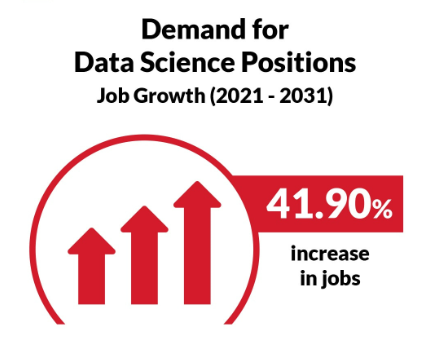Introduction
With data science and generative AI booming in today’s market, working professionals and freshers would aspire to pursue or upskill their careers in AI and data science. Companies are constantly on the lookout for talented and skilled data science engineers with sound knowledge of generative AI concepts. This is because most organizations across industries heavily depend on data and look for ways to automate data management and enhance the accuracy of predicting outcomes.

Before you aim to pursue a career in data science, you need to be proficient in programming languages like Python and R. You should also be proficient in cleaning data, creating visualizations, and implementing various machine learning algorithms as well. Having a good grip of these technologies would help you in handling complex datasets and performing advanced analytics. Most importantly, your growth and skills need to be showcased through projects that you have worked on previously, and you should be committed to lifelong learning as AI and data science are constantly evolving. There are a variety of AI jobs in 2025; here are the top six AI and data science jobs.
Data Engineer
Did you know that the data engineering job market is estimated to grow at a CAGR 36.7% within the next five years? As most companies are facing challenges in handling their data infrastructure, it is challenging for them to collect, store, and process data efficiently. This is where data science engineers with knowledge of generative AI come into the picture. As a data science engineer, you could become the backbone of an organization when it comes to building, optimizing, and maintaining the technical infrastructure. Data engineers ensure that data is collected, stored, and easily accessible by authorized analysts. A data engineer designs databases, gathers data from APIs, and writes scripts to transform datasets. They also help in building automated pipelines and managing the cloud infrastructure. Here are the key skills and responsibilities of data engineers.
- ● Build scalable data pipelines that process large datasets efficiently
- ● Coordinate with data science engineers and AI product managers to help in optimizing operations
- ● Establish seamless data collection from APIs and external data sources
- ● Automate data workflows with dbt and Apache Airflow
- ● Implement CI/CD pipelines and automate data processes
- ● Be proficient in Python, Java, or Scala with deep knowledge of SQL and NoSQL databases
- ● Have hands-on experience with big data frameworks like Apache Spark and Hadoop
AI Data Scientist
In today’s fast-paced landscape, being a highly skilled and experienced traditional data scientist is not enough. You should also be well-versed in AI tools and how to make the best use of them to optimize operations effectively. Did you know that AI data scientists are the next evolution in data science? They showcase their expertise in deploying advanced machine learning techniques and implementing AI-powered solutions like natural language processing and generative AI systems. An AI data scientist fine-tunes LLMs and develops computer vision algorithms for image recognition and other relevant applications. Here are a few key skills and responsibilities of an AI data scientist.
- ● Work together with data engineers to create real-time systems and data pipelines driven by AI
- ● Use frameworks such as GPT, DALL-E, and other foundation models to create generative AI solutions
- ● Assess the performance of AI models and put ideas for ongoing improvement into practice. ,li
- ● profound knowledge of machine learning frameworks such as scikit-learn, PyTorch, and TensorFlow
- ● Knowledge of deep learning concepts, neural networks, and transformer structures
- ● Should be familiar with cloud services and AI platforms like AWS SageMaker and Google AI Platform
Business Intelligence Developer
Business intelligence developers help organizations in transforming raw data into powerful insights for smart business decisions. They analyze historical information and examine the data to uncover actionable insights for the best results. As a BI developer, you will create in-depth reports, sophisticated data models for improved accuracy, and ensure to suggest the right kind of data for appropriate business decisions. Here are the key responsibilities and skills required for business intelligence developers.
- ● Create and implement BI solutions that are suited to the particular requirements of the business
- ● Ensure excellent data dependability and integrity on all platforms
- ● Create BI and analytics solutions that are easy to use
- ● Proficiency with BI technologies like Tableau, QlikSense, or Power BI
- ● strong database administration and SQL skills
- ● Proficiency in data modeling to enable successful business intelligence solutions
- ● Ability to convert complicated data into reports that are straightforward and concise
AI Engineer
AI engineers design and deploy AI-driven solutions that help businesses automate processes and make informed decisions. As an AI engineer, you will be expected to analyze and implement a broader engineering infrastructure that could be scaled across the organization. The key here is to think holistically to ensure how the optimized process helps the organization/client. AI engineers develop new machine learning models, optimize existing algorithms, and implement AI solutions in production environments. They collaborate with software developers and data scientists to ensure that the AI systems are seamlessly integrated with the workflow. Here are a few key roles and responsibilities of an AI engineer.
- ● Improve and hone AI algorithms for practical uses
- ● Create APIs and incorporate AI into pre-existing software systems
- ● Analyze the model's performance and make iterative adjustments in response to data-driven input
- ● Deliver AI-driven projects in line with strategic objectives
- ● Advanced knowledge of programming languages like C++, Java, or Python
- ● Proficiency with machine learning frameworks such as scikit-learn, PyTorch, and TensorFlow
- ● Solid mathematical background in linear algebra, calculus, and statistics
- ● The capacity to implement and oversee machine learning models in cloud settings, such as AWS, Azure, or GCP
Machine Learning Engineer
Machine learning engineers help businesses by transforming traditional data science models into production-ready applications that are powered by machine learning algorithms. You can help organizations in integrating external datasets and optimizing model performance as a machine learning engineer. You can build APIs to make models accessible to users and deploy feature transformations to improve model accuracy. As a machine learning engineer, you need to do the following.
- ● Creating and implementing scalable, effective machine learning systems
- ● Applying machine learning techniques to address practical issues
- ● Testing and experimenting to track and enhance model performance
- ● Making machine learning systems more efficient for use in industrial settings
- ● Proficiency with Python and C++, two programming languages
- ● Knowledge of popular machine learning frameworks, such as PyTorch and TensorFlow
- ● Familiarity with algorithms and data structures for creating effective models
- ● Knowledge of cloud computing systems that facilitate machine learning
Data Privacy Officer
With data breaches becoming common due to growing data brokers and hackers, businesses are looking for professional data privacy officers who keep their data secure. As a Data Privacy Officer (DPO), you will be tasked with safeguarding an organization’s data. You should also ensure compliance with evolving privacy regulations. You should also conduct impact assessments, develop privacy policies, and keep employees educated on proper data practices as well.
- ● Make sure that the CCPA, GDPR, and other pertinent privacy rules are followed
- ● Assess privacy issues on a regular basis to identify and reduce them
- ● Teach staff members how to handle data properly
- ● Address and resolve privacy concerns or data breaches as soon as possible
- ● Thorough knowledge of privacy laws at the national and international levels
- ● Capacity to evaluate risks and spot possible security flaws
- ● Technical know-how to put data security measures into action
Now that you know what the most relevant AI and data science job roles are that are in demand in 2025, you might wonder how to proceed with learning the essential skills for your new role. That is where Eduinx can help. As a learning edtech institute, our mentors will guide you in learning the essential industry-relevant concepts that help you upskill in your career. In this way, you could land one of the best AI jobs in 2025. You can take up the data science with generative AI course at Eduinx and get the required guidance from our mentors on choosing from various generative AI jobs in the market.




